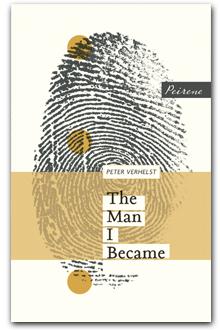We who had known the shifting sky as our ceiling
 The Man I Became
The Man I Became
by Peter Verhelst
translated from Dutch by David Colmer
How do you approach a book narrated by a gorilla? Or, at least, a character who started life as a gorilla? Honestly, if I hadn’t received this book as part of my Peirene subscription, based on the synopsis I would not have picked it up. And I would have missed out.
This novella treads a line between science fiction and fairy tale – the dark kind of fairy tale, not light and fluffy Disney fare. The result is an odd allegory of…what, exactly? A few different things, I think, and no doubt many more things than I picked up on.
Our narrator was a gorilla snatched from the jungle, along with most of his family, and taken by boat to “the New World” to be turned into a human. So far, so clearly related to slavery, right down to the overcrowded boat and casual lack of consideration for the gorillas’ lives.
“We who had known the shifting sky as our ceiling our entire life, our only master the sun that set the red lake ablaze, the swarms of insects like tiny explosions over the water, our salvos of lazy laughter causing a frigate bird to linger over the crowns of the trees…we no longer knew what the open air was. Lights off: bed. Lights on: get out of bed, wash, get dressed.”
But then it gets odder. The gorillas are shaved and simply educated to act increasingly human – in fact, to be ladies and gentlemen. They’re not the only animals undergoing the process, and they’re not all from the ape family.
It gets weirder still. It turns out that they are in a theme park, centred around a huge live-action show performed every night depicting evolution with real wild animals shipped in and trained by formerly wild animals who now look human.
“Now and then there was a glimmer of who we had been – somebody thrusting their face at yours and baring their teeth – but we were all slimmer than before, we stood nice and straight, we covered our mouths with our hands when we coughed…We learned all the things our bodies didn’t seem to have been made for and doing so gave us new bodies.”
Verhelst gives his narrator some ethical dilemmas to underscore the point being made about human weakness and assumptions of human superiority. And despite my reservations I did grow to like the narrator and root for him. But it takes a tremendous suspension of disbelief to read this without constantly questioning the premise and I found I couldn’t quite do it.
I couldn’t help comparing this unfavourably to Flowers for Algernon by Daniel Keyes, which I would argue is one of the greatest books ever written so it’s a really unfair thing to do, but the similarity is real. Verhelst’s is a more original premise, with far more allegorical potential, but in many ways it’s the same story, down to the first-person narrator and growing awareness of the wider experiment and indeed world. Keyes’ book hit me hard and has stayed with me for years now. It is a masterclass in character creation. The Man I Became is good, but not that good.
Published 2016 by Peirene Press.
Source: I subscribe to the publisher.